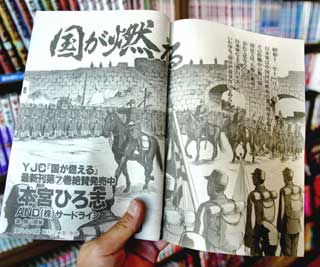|
Japan publisher stops Rape of Nanjing comic
(Agencies)
Updated: 2004-10-15 09:06
A Japanese publisher will suspend a comic series in its popular weekly magazine after receiving angry protests over its characterization of the 1937 "Rape of Nanjing," in which Japanese soldiers brutally massacred Chinese civilians.

A reader poses with the comic series "Kuni ga Moeru" (The Country is Burning), which will be suspended after receiving angry protests over its characterisation of the 1937 "Rape of Nanjing" in which Japanese soldiers brutally massacred Chinese civilians, at a "manga (comic)" cafe in Tokyo October 15, 2004. [Reuters] |
Tokyo-based Shueisha Inc. received nearly 200 angry phone calls and letters protesting its portrayal of scenes of the killings in its comic "Kuni ga Moeru" (The Country is Burning), published on September 22, a company spokesman said Thursday.
"We have received suggestions and protests from people from all walks of life including local politicians," said a company spokesman. "There were inappropriate parts and we decided to suspend the comic series for the time being."
Japanese politicians have often incurred Beijing's wrath by challenging China's account of the massacre, called the Rape of Nanjing, in which as many as 300,000 Chinese men, women and children were slaughtered by rampaging Japanese troops in the former Chinese capital.
The comic series, featuring the life of a Japanese bureaucrat in the tumultuous times of the early 20th century, had been carried by popular Weekly Young Jump. The Shueisha spokesman said about 2 million copies of the magazine had been sold each week.
A group of 37 members of local assemblies protested to the publisher earlier this month, arguing that the Rape of Nanjing had never taken place and that the depiction of the scene in the comic distorted history.
The publisher plans to change or delete some parts of the comic when it publishes the series in book form, the spokesman said, without elaborating.
Japan-China relations remain bedeviled by the two nations' wartime past. China suffered from Japanese military aggression in the 1930s and 1940s.
Bilateral ties have been further strained by Japanese Prime Minister Junichiro Koizumi's annual visits to Tokyo's Yasukuni Shrine, which honors war criminals along with other war dead.
Koizumi has visited the shrine each year since taking office in 2001, most recently on New Year's Day, a visit condemned by China and South Korea, also a victim of Japan's wartime aggression。
|